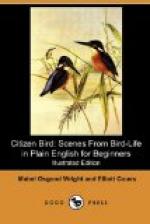“The Indigo Bird has many of the Canary’s gentle ways, and though his music is not so fine or varied as that of the Goldfinch or Song Sparrow, he sings a sweet little tune to his brown mate on her nest in the bushy pasture.
“She is fortunate in having a dull dress; for, if she were as splendidly blue as her husband, nesting would be a very anxious occupation for her. Indeed, her poor mate has anything but an easy time; his color is so bright that everybody can see him at a glance, and when he picks up grass-seed in the streaming sunlight, his feathers glisten like sapphires.”
“We saw an Indigo Bird yesterday!” cried Nat and Dodo together. “It was in the geraniums by the dining-room window, eating the seed I tipped out of my Canary’s cage when I cleaned it,” continued Dodo. “Mammy Bun said it was a Blue Canary, but Nat said it couldn’t be, and I forgot to ask about it.”
“Are you going to tell us about many more birds in the Finch family, Uncle Roy?”
“Not now. You have heard about those that will be most likely to attract your attention, and when you can name them, they will introduce you to all the rest of their relations.”
[Illustration: INDIGO BIRD.]
“It is a great family,” said Rap, who was sitting thinking. “Big birds and little, plain gray and brown, or red, blue, and yellow—some like warm weather and some want it cold.” “Speaking of cold, I wonder what became of the ice that Dodo saw Mammy Bun cracking this morning?” asked the Doctor, looking at Olive. “The very word has a pleasant sound, for it seems to me to be growing warmer and warmer.”
“Toot! toot! t-o-o-t!” squeaked a tin horn across the field from the direction of the farmhouse.
“What’s that?” said Nat, jumping up; “it’s the dinner horn, and it can’t be dinner-time.”
“Not more than eleven o’clock,” said Rap, looking at the sun after the fashion of those who spend much time out of doors.
“I know what the horn means,” said Olive. “It means that the cake, that Nat said Mammy Bun was going to bake with the ice, is done!”
“But that was only nonsense, you know,” said Nat. “Ice won’t bake anything!”
“Perhaps not, but ice can freeze something, if you mix salt with it, even on this warm day, and the horn means that mammy has a tin pail full of ice cream, waiting for some one to eat it! Ice cream, made with fresh strawberries! Don’t break your neck, Nat!” For Nat had dashed off so quickly that it was no use for Dodo and Rap to try to keep up with him.
“Why do you mostly have something nice for us to eat on bird-days?” asked Dodo, cuddling into the bend of her uncle’s arm.
“For two reasons, girlie. When I was a boy, being out of doors made me so hungry that it always seemed a long time between breakfast and dinner. I know that little brains remember best when the stomachs that nourish them are not empty. Neither Bird Children nor House Children should go too long hungry; it is as bad as nibbling all day.”




